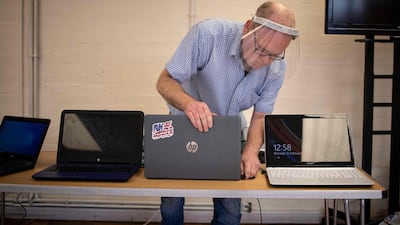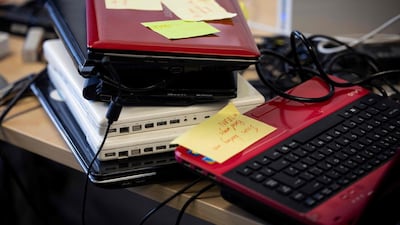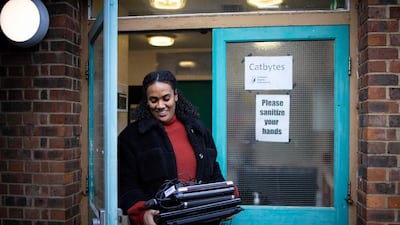A UK charity in south London is trying to end educational inequality by donating computers to disadvantaged pupils kept out of the classroom by coronavirus.
It is estimated that more than a million schoolchildren in Britain cannot access lessons online because they do not have computers or laptops at home.
But the CatBytes group, in the deprived London borough of Lewisham, hopes to solve this problem. It said demand from local schools is outstripping supply.
"The demand from Lewisham is way in excess of what we can deliver," said CatBytes founder Damian Griffiths, who works with volunteers fixing donated computers.
Schools in England closed in early January when the new variant of coronavirus caused a sharp increase in the number of coronavirus cases.
A date for reopening has not yet been set but the government said it will announce a roadmap next week for easing restrictions.
The closure revealed the large number of families unable to afford laptops or tablets for remote learning.

"Food insecurity was the main issue discussed but I think digital [scarcity] is really rising up the ranks," Mr Griffiths said.
"I was surprised at how many [children] don't have any laptops at home."
Lewisham is not exceptional: the number of children in poverty in the borough is only slightly below London's average.
CatBytes usually runs workshops for adults, but during the pandemic it has switched to helping children.
Mr Griffiths said the charity now has "a lot more volunteers", who sort through the laptops, prioritising those that can be fixed easily and distributed quickly.
Marz, who is repairing a donated computer, usually works as a videographer. "We can fix during our little downtimes," he said.
The communications regulator Ofcom estimates that between 1.1 million and 1.8 million children in the UK – 9 per cent – do not have access to a computer, laptop or tablet at home.
"They don't have something appropriate for doing schoolwork or homework," Mr Griffiths said. "And now, with online learning, online schooling, every child needs a laptop."
The Department for Education delivered more than a million laptops and tablets to the most disadvantaged children across the country, as part of a £400 million ($554m) investment to support schools.
Stacey McIntosh, the pastoral manager and safeguarding leader at Rushey Green Primary School in Catford, dropped in to pick up five laptops for pupils.
While the school received 74 laptops and tablets from the government and some wireless routers, those were not enough, she said. "There are still children without computers."
The school provides children who do not have their own devices with printed-out lesson packs, but they are "missing out on key learning from their teacher", Ms McIntosh said.
Rushey Green school has received more than 30 laptops from CatBytes since January, which Ms McIntosh said was important for children's social lives during lockdown.
"The children have lost their friendships, their teachers who they are close to," she said. "Being able to give them the opportunity to get online to see their friends virtually in those little squares ... it's significant."
Vital as the computers are, some children face an additional struggle because their families cannot afford internet access.
"The main problem that no one knows how to fix is the data problem," Mr Griffiths said. "With a laptop, somebody can give it to you and you can refurbish and redistribute it, but data is an ongoing cost."
Ofcom says that 7 per cent of households can access the internet only through a mobile device such as a dongle or USB.
Data providers, such as Vodafone, BT Mobile and O2, are now offering free mobile data increases.
Schools and local authorities in England can request this on behalf of children who do not have fixed broadband at home, cannot afford additional mobile data and are experiencing disruption to education.
But, Mr Griffiths said, users still have to pay at least a small amount. "That's probably a problem that would need to be solved at a higher level."







